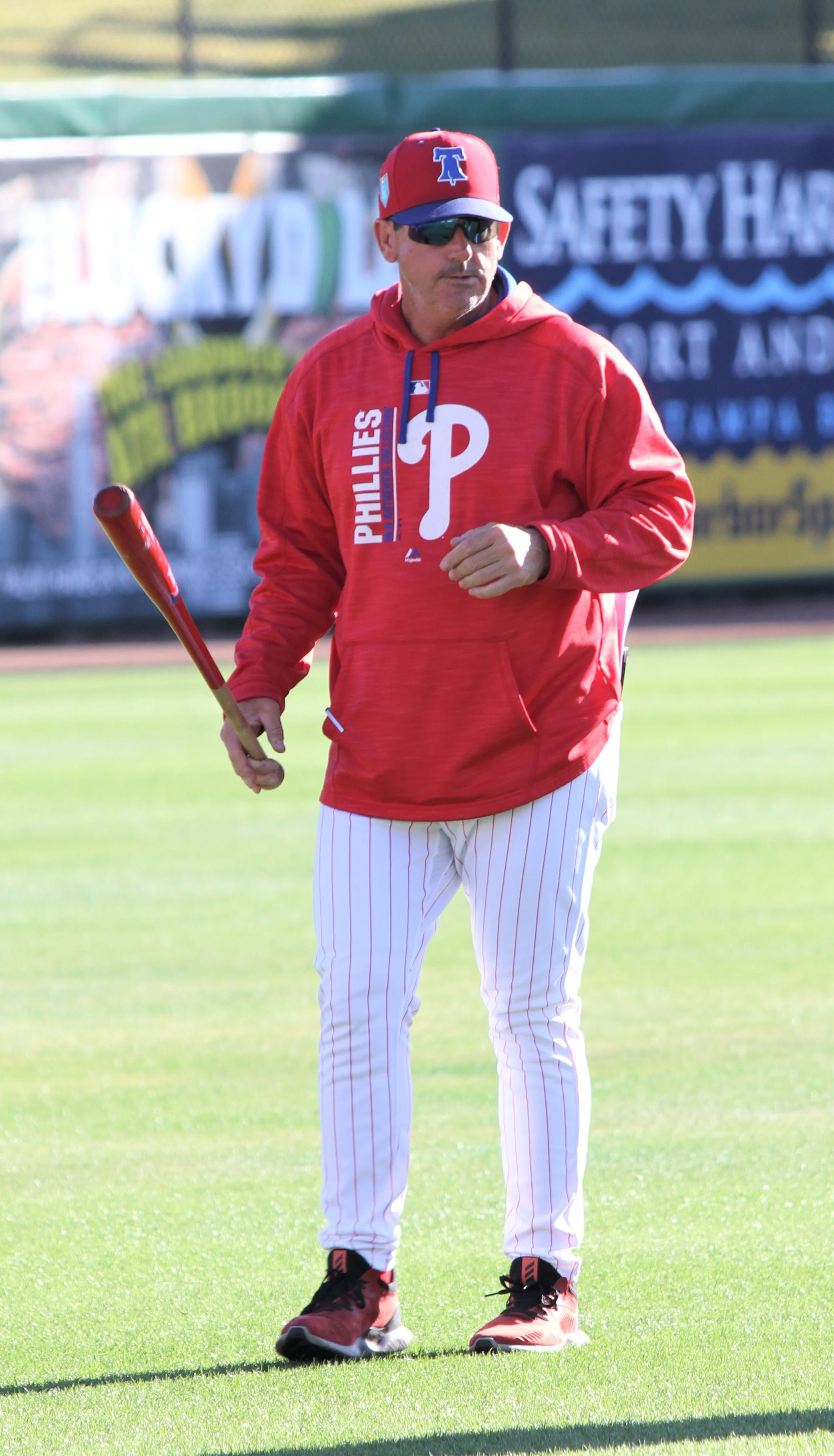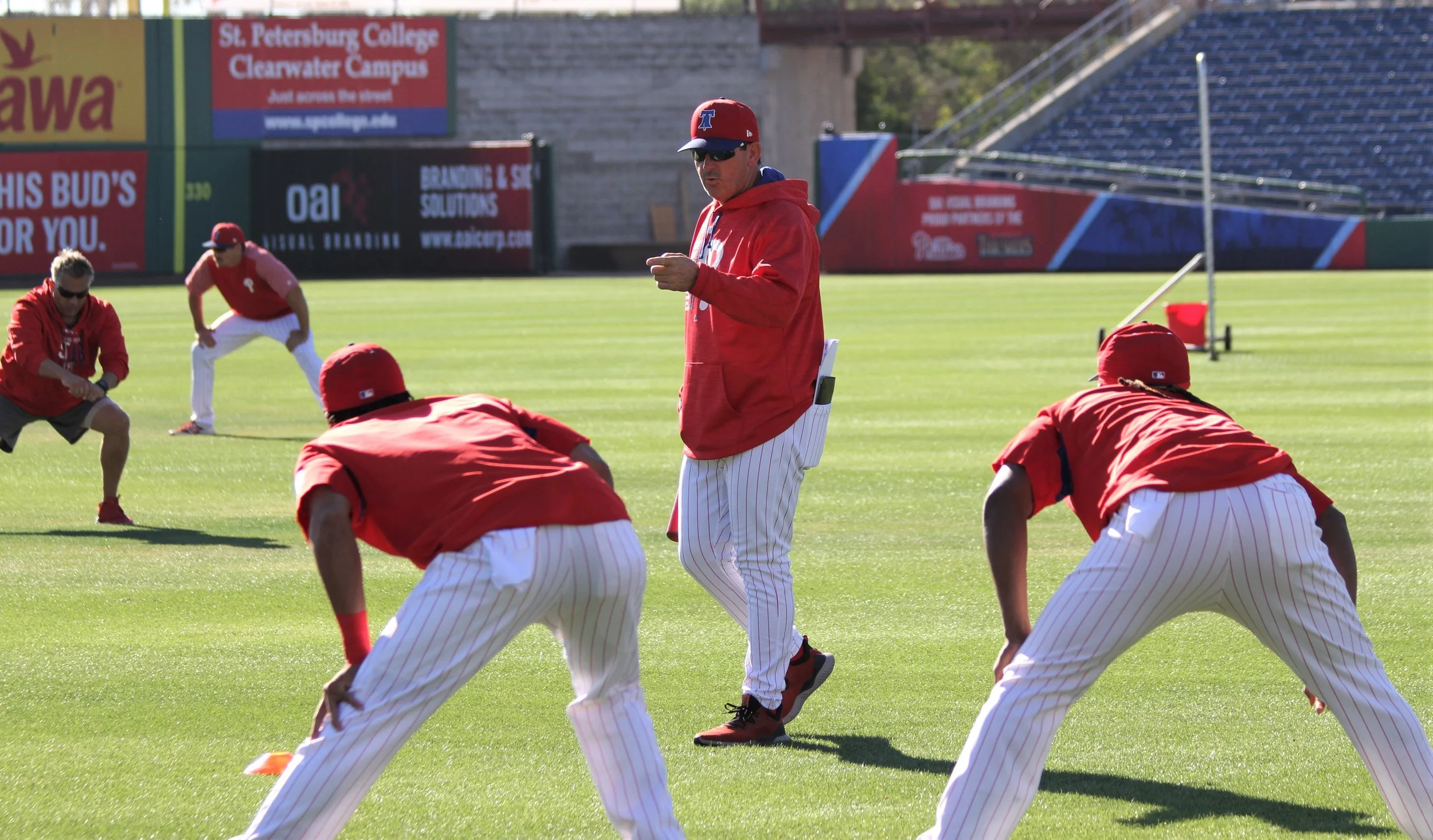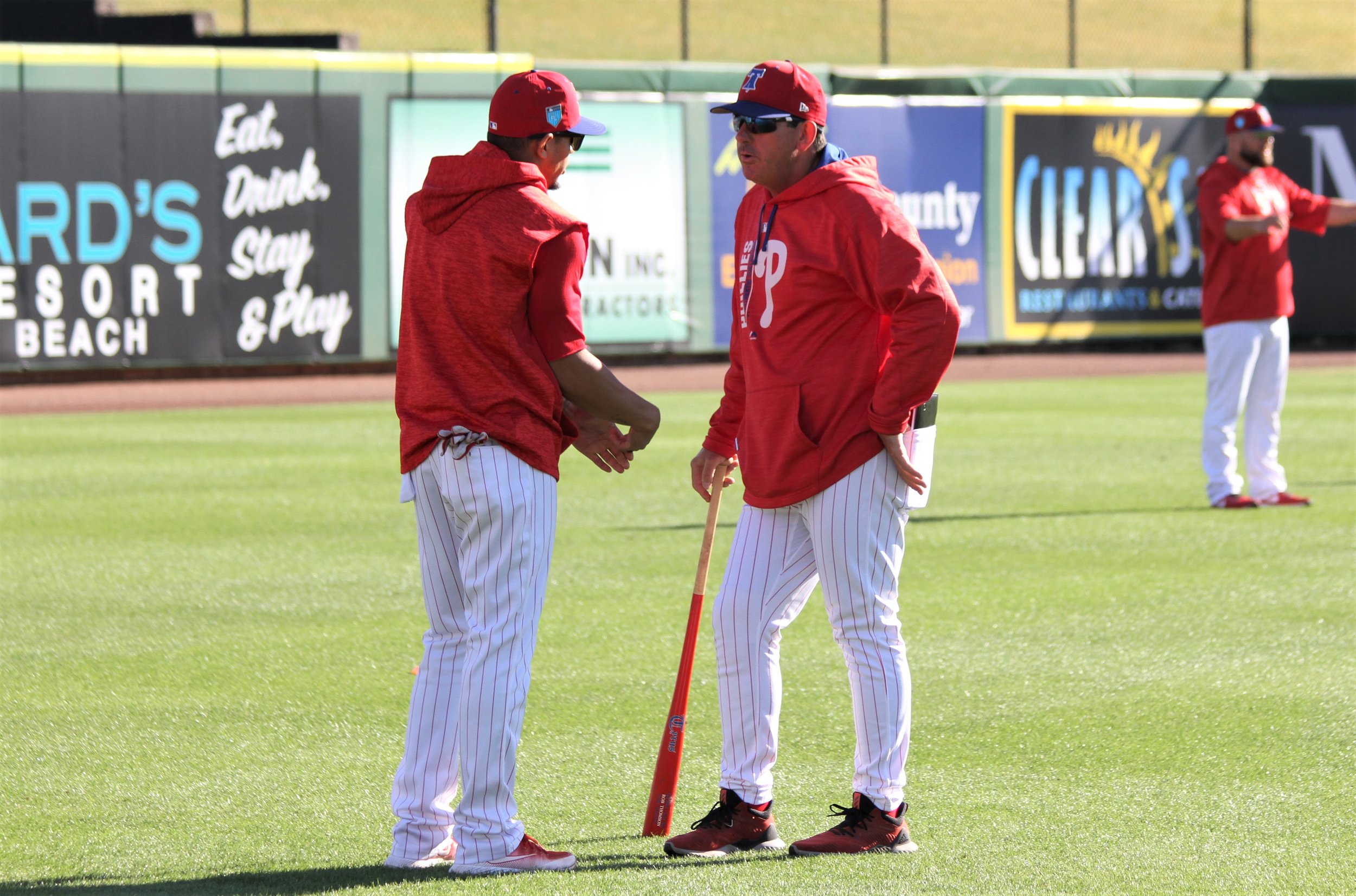Thomson building trust in new role as Phillies' bench coach
Philadelphia Phillies' bench coach Rob Thomson (Corunna, Ont.) has impressed his new club with his ability to connect with the players. Photos: Matt Antonacci
By J.P. Antonacci
Canadian Baseball Network
It’s just after 9 a.m. on a Saturday morning at Spectrum Field in Clearwater, Fla., the spring training home of the Philadelphia Phillies. Towels in hand, a few stadium employees walk up and down the aisles, wiping the remnants of that morning’s rainfall off the empty seats.
A few dozen Phillies players are spread in a large circle in left field, stretching in preparation for a day of workouts that will culminate in an afternoon game against Atlanta.
Rob Thomson (Corunna, Ont.) makes his way around the circle, a notebook sticking out the back pocket of his pinstriped pants. He pauses to chat with each player, sometimes demonstrating a point using a red fungo bat that matches his brightly coloured hoodie.
Thomson (middle) chats with Phillies players during their morning workout in Clearwater, Fla. Photo Credit: Matt Antonacci
Philadelphia’s new bench coach has many words of wisdom to offer after three decades in the Yankees organization, including 10 years on the major league coaching staff. But before the baseball lifer from Corunna, Ont. can impart any tips to his new charges, he has to win their trust.
“It takes time. You have to get a relationship going first, and once you get that relationship you gain trust, back and forth,” Thomson explained.
“Once you’ve got the trust, then you’ve got them. You can quickly fix things, and they understand that the only reason you’re doing it is for their benefit. There’s a love there for them. Once you have that, then you’re on your way.”
The red pinstripes are more than a splash of colour for Thomson after 27 seasons in Yankee black and white. The 54-year-old had spent his entire coaching career in New York, serving as a minor league manager, field coordinator and director of player development, as well as third base coach and bench coach under manager Joe Girardi.
Thomson already had the Phillies’ offer in hand when in early November he interviewed to succeed Girardi as Yankees manager, a job that eventually went to former player Aaron Boone. A month after that interview, Thomson was announced as a veteran hire to help Gabe Kapler navigate his first season as an MLB manager.
“I decided to come here as bench coach before any decision was made in New York,” Thomson said, explaining that the Phillies would have let him out of his contract to manage the Yankees.
After meeting with Philadelphia’s front office staff and talking things over with Kapler, Thomson decided to make the move.
“I think anytime you spend close to 30 years with one organization there’s some emotion involved. I really loved my time with the Yankees, but the world tells you what to do sometimes,” Thomson said.
“(The Phillies) blew me out of the water. There are extraordinary people here. They care about the players and they care about the other people around them, so it’s been an easy transition. When I got here, I fell in love with this place, and hopefully I spend the rest of my career here.”
A PUZZLE GUY
Kapler says what he’s seen so far from his new bench coach has exceeded his already high expectations.
“I’ve noticed that the work ethic is off the charts. Also, the teammate behaviour is exceptional – your responsiveness to your teammates, how well you support them,” Kapler said.
“I love the way his mind works. I knew that he was comfortable having hard conversations with players. That’s a trait I respect greatly in a man. I could go on and on. I just think he was the perfect fit for us, and he has been an extraordinary mentor and partner to me.”
Thomson sees his role as bench coach to Kapler, a former MLB outfielder who managed one minor-league season and coached Team Israel at the 2013 World Baseball Classic, as unchanged from working under a veteran manager like Girardi.
“It’s just throwing ideas at somebody. Obviously, the manager has final say, but you just keep coming with more ideas and different scenarios, and they do with it what they want,” Thomson said.
“It doesn’t matter how many times they say no; once you stop bringing ideas, it’s time to get somebody else. You’ve got to keep coming, keep coming, keep coming.”
To get to know his new organization, Thomson took on the challenge of coordinating the Phillies spring training schedule, a role he excelled at in New York.
“I’m a big puzzle guy. That’s why I like organizing (spring training). It’s like a big puzzle,” said Thomson, who spends his off-seasons at home in Stratford, Ont.
He said he observed how the Phillies did things before adding his own spin.
“You’ve got to try and keep it as consistent as possible. You have new ideas, but again, you have to gain the trust of other people before you start throwing stuff at them,” he said. “It’s really been an easy transition, because the way they run bunt defences and cuts and relays, and all the little fundamental things, are very similar to how we did things in New York.”
Kapler said having Thomson in charge of scheduling in Clearwater allowed him to better acclimatize to managing at the major league level.
“His preparation and his ability to plan and run our workouts has freed me up to research, to think and have conversations with players, to be a better teammate myself,” said Kapler, who appreciates Thomson’s understated leadership style.
“He’s one of the better listeners I’ve ever been around. He’s constantly taking notes in his mind and he’s happy to let the room settle and have the conversation, and observe,” Kapler said. “Then at just the right moment he comes in with a nugget that is incredibly insightful and impactful. I value and respect people who listen well.”
HANDS-ON APPROACH
Building one-on-one relationships with the players is key for Thomson (left) in his role. Photo Credit: Matt Antonacci.
Thomson is a constant presence on the field, working one-on-one with players and keeping tabs on how they’re doing. He says that hands-on approach is a crucial part of connecting to players and winning their trust.
“Absolutely. Because the players want coaches, managers, whoever’s around then, to be involved,” he said.
“The guys who sit back, tilt their hat back and just let them throw the balls and bats out and go play ball, well, there’s no connection there. (The players) feel like, is this guy really invested in me or not? But when you get with them and talk to them and touch them and be with them all the time, they feel like, okay, he’s got me. You’re there for them, not for yourself. And that’s what coaching or managing is all about.
“And it’s not fake – Gabe is as genuine a person you’ll ever meet, and I feel like I am too. We’re engaged in their development and how well they do, because if they do well individually they’re going to do well as a team, for the most part. That’s the way I am and that’s the way Gabe is. But not everybody’s like that.”
After finishing last in the National League East in 2017, Philadelphia bolstered a core of promising young players led by Rhys Hoskins and Scott Kingery with several veteran free agent acquisitions, including 2015 Cy Young Award winner Jake Arrieta and slugging first baseman Carlos Santana. It’s a combination that has Thomson excited about the year ahead.
“I think they’ve really done a great job in player development and scouting to get the Hoskins and the Kingerys ready, and all these young players are here,” Thomson said.
“Now they’re starting to punch in some experience – Santana, Arrieta, Tommy Hunter, Pat Neshek – to supplement that experience part in the clubhouse. I think they’re a really good mix. Yeah, I think we’re on the upswing.”



